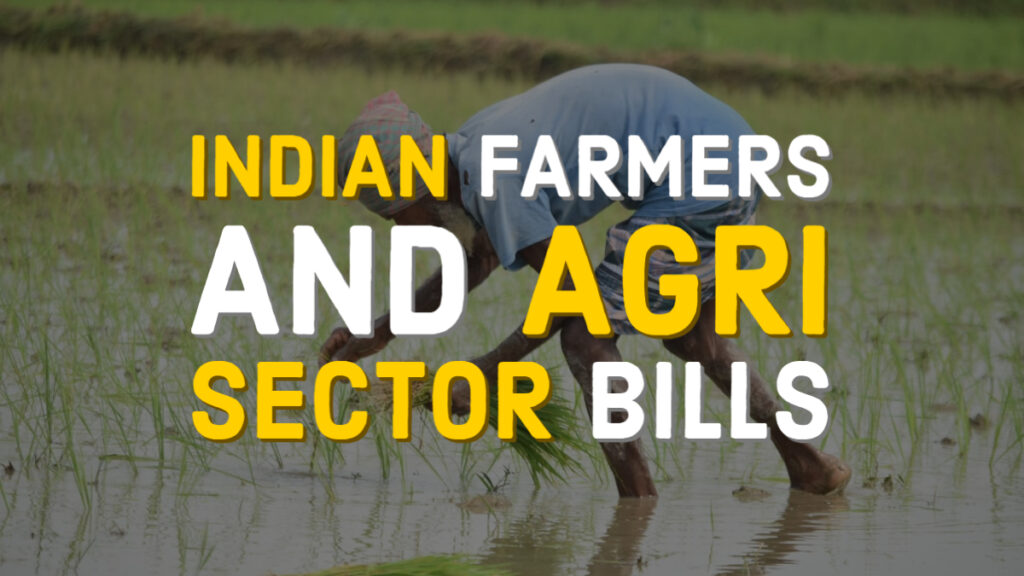The agri sector bills aim to increase competitiveness in agriculture supply chain and freedom of choice to sell their produce to Indian farmers. But, will there be a level playing field for farmers?
Two of the three controversial agriculture sector bills – namely The Farmers’ Produce Trade and Commerce (Promotion and Facilitation) Bill, 2020 and The Farmers (Empowerment and Protection) Agreement on Price Assurance and Farm Services Bill, 2020 – have been finally passed by both the houses of Indian Parliament during the third week of September 2020. The third bill – The Essential Commodities (Amendment) Bill, 2020 – was passed from the Lok Sabha on September 17, 2020. All three bills, especially the ones which had been passed by Rajya Sabha on September 20, 2020, have created a furore across the nation.
Many farmers’ union and political parties especially the opposition is protesting against these three bills. However, the ruling government is defending the bills by arguing that these bills will provide and establish an ecosystem that facilitates remunerative prices, efficiency, transparency, and barrier-free trade and commerce of farm produce.
Background:
The problems of the agriculture sector are many, some of which like the problems of credit & finance and marketing of farm produce are acute. The majority of farmers (86%) in India are small and marginal (with less than two hectares of land) and reaching them with credit, marketing, advanced technology, and farm services is a very challenging task for the government.
The problem of exploitation of farmers by commission agents of APMC yards or ‘mandis’ is common. This results in very poor bargaining and restricts farmers to sell farm produce outside the ‘mandis’.
The States which have implemented the system of Agriculture Produce Market Committee (APMC) for the trading of farm produce have faced limiting success. In most states, the system has hindered the freedom of choice to sell and purchase the farm produce. The problem of exploitation of farmers by commission agents of APMC yards or ‘mandis’ is common. This results in very poor bargaining and restricts farmers to sell farm produce outside the ‘mandis.’ Lack of price information and market intelligence results in lower earnings from selling farm produce in these ‘mandis.’
The efforts to increase competitiveness in agriculture supply chain and to provide freedom of choice to sell their produce using Model APMC Act, 2003 and the Model Agriculture Produce and Livestock Marketing (Promotion and Facilitation) Act, 2017 have not proved worth because of lack of interest of States and non-uniformity in State APMC legislations.
What are the main provisions of agri sector bills?
The Essential Commodities (Amendment) Bill, 2020: The bill seeks to remove commodities like cereals, pulses, oilseeds, edible oils, onion, and potatoes from the list of essential commodities. How will it mpact farmers’ income and consumers’ interests? One should first understand that the central government controls the production, supply, distribution, trade, and commerce of the enlisted essential commodities. The bill proposes to liberalize the regulatory system of controlling the supply chain and imposition of the stock limit of such items that are removed from the list of essential commodities. However, the bill allows government to regulate the supply chain under extraordinary circumstances like war, famine, natural calamities, etc.
The Farmers (Empowerment and Protection) Agreement on Price Assurance and Farm Services Bill, 2020: The bill seeks to provide for a fair and transparent national framework on the farming agreement. The provisions are to engage farmers with agribusiness firms, processors, wholesalers, exporters, and large retailers for the sale of farm produce (called trade and commerce agreement). Supposedly, it would protect the rights of farmers, and empower them by engaging with the private corporate sector that facilitates farm services (called production agreement) as well as future/contract sale agreement. These farm services include a supply of seeds, feed, fodder, agrochemicals, machinery & technology, advice, and agri-inputs. The agreements are supposed to have predefined terms & conditions on its period, quality, grade and standards of farm produce, and pricing. State governments may provide a facilitative framework for the registration of farming agreements by establishing the Registration Authority.
Also Read: Agri Bills: Why are Farmers Protesting even after PM’s Assurance?
Other than these provisions, the agreements may be linked to insurance or credit policies. The bill also provides for a dispute settlement mechanism having a conciliation board and prohibits sponsors (person entering into a farming agreement with the farmer) from acquiring ownership rights or making permanent modifications on farmer’s land to protect the fundamental rights of the land of farmers.
The Farmers’ Produce Trade and Commerce (Promotion and Facilitation) Bill, 2020: The bill seeks to facilitate remunerative prices for farmers’ produce and gives freedom of choice to sell and purchase farmers’ produce outside the physical premises of markets notified under various State APMC acts called ‘mandis’ to whoever they want. It also facilitates inter-state and intra-state trade and commerce of farm produce, which is not possible under the current legislations.
It also facilitates inter-state and intra-state trade and commerce of farm produce which is not possible under present legislations on agri-sector.
This trade will be done using an electronic platform where the sale and purchase will take place through a network of electronic devices or internet applications. All these transactions or trading in scheduled farmers’ produce in the trade area will not attract market fee, or cess or levy. To increase the bargaining power of farmers a Price Information and Market Intelligence System (PIMIS) is proposed to be developed.
How will it impact farmers and consumers?
The provisions, on one hand, seek to increase competition in the agricultural sector, enhance farmers’ income. On the other hand, they also try to protect the interests of consumers by increasing consumers’ surplus. This will lead to addition of ‘commissions’ and ‘mandi fees’ in producers’ and consumers’ surplus. With the introduction of the above mentioned agri sector bills, it is expected that the problems of marketing and investment in agriculture can be addressed. The amendment in the Essential Commodities Act (1955) will give freedom to conduct trade and commerce in commodities that will be taken out of the essential commodity list.
The provisions of contract farming, farm services and future/contract agreements will help small and marginal farmers by providing them the necessary investment, decrease in transportation cost, transferring the risk of market unpredictability to sponsors, and freedom to sell their farm produce to whoever they want in their own state or any other state of India. It will also facilitate timely payments to farmers for their produce and in case of any breach of agreement, the dispute settlement system will protect the rights of farmers.
The government is arguing that the removal of bottlenecks, like the role of mediators, easy marketing, farm services, and freedom to sell the farm produce, will empower Indian farmers.
But there are some doubts about the optimistic attitude and provisions of these bills. First, the amendment in Essential Commodities Act may affect the Public Distribution System (PDS) because the government procurements for PDS may decrease when the competition comes into play. It may also result in black marketing of essential food items.
Second, the opening of agri sector to big corporates and capitalists may deteriorate the terms of trades for farmers as the basic driving factor of the private sector is profit.
Third, the farmers are already not getting good prices for their produce in the market. This is the reason for their dependence on government procurements and minimum support price systems. The proposed privatization of agriculture may add fuel to the problem of low prices for farm produce.
Fourth, the traditional jobs of commission agents or ‘arhatiyas’ will be lost and even the States will lose its commission (6.0 percent of the transaction) for APMC yards. This will result in vanishing of old ‘mandis’. The introduction of contract farming may render many landless agriculture labourers jobless. This will further aggravate the problem of unemployment in our country.
The implications and impacts of these bills are far-reaching but the government is greatly optimistic about the provisions of the bills. The government is arguing that removal of the bottlenecks, like the role of mediators, easy marketing, farm services, and freedom to sell the farm produce, will empower Indian farmers. The government will protect the rights of farmers using safeguarding measures. The government hopes that the bill will make farmer the master of his own as far as the sale of produce is concerned. However, it is to be seen that how a farmer handles its terms of trade in direct contract or agreements with corporates and private firms. Will there be a level playing field for farmers?
Disclaimer: The views expressed in this article are of the author solely. TheRise.co.in neither endorses nor is responsible for them.
About the author
Dr. Suraj Sharma is a Researcher and Assistant Professor, Department of Economics, S.M. (P.G.) College, Chandausi (M.J.P. Rohilkhand University, Bareilly, Uttar Pradesh, India







Pingback: Agri Bills: Why are Farmers Protesting even after PM’s Assurance?
Pingback: Farm Acts and Smart Farmers - Agriculture TheRise.co.in
Pingback: Farmer Unions and the Logic of Survival - TheRise.co.in
Pingback: Can NEP 2020 show the way to Modi Government on Farm Laws issue?